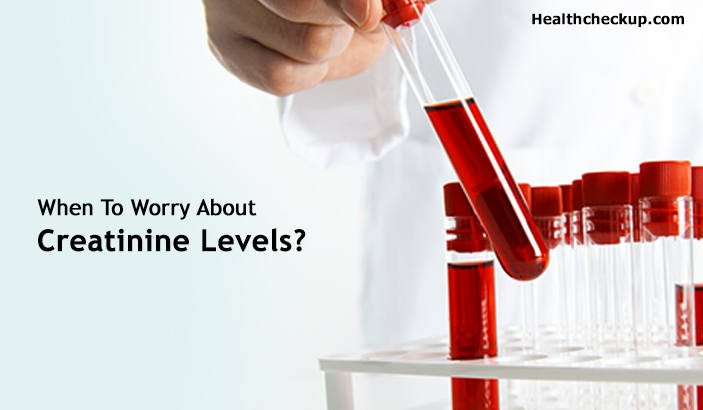What Is Creatinine?
Creatinine is formed during the synthesis process of phosphocreatine. During the breakdown of creatine phosphate, creatinine is produced. Creatine is synthesized mainly in the liver. From the liver, it is transported to various organs including muscles. In the presence of enzyme creatine kinase, phosphocreatine is produced from creatine resulting in the formation of creatinine as a by-product. Creatinine is transported to blood from where it gets excreted by kidneys via urine. Many people ask the nephrologists when to worry about creatinine levels. Here in this article, you can know the creatinine levels during kidney disease and when to worry about creatinine levels.
Why Is It A Measure Of Kidney Function?
Creatinine levels in the blood is a measure of kidney function. If the kidney is not functioning properly, it will not effectively eliminate the accumulated creatinine from the blood. This will result in an increased creatinine level. When the creatinine levels get increased in the blood everyone will start worrying about the elevated creatinine levels. Here you can know in detail about when to worry about creatinine levels. It is to be noted that an increased level of serum creatinine is a preliminary marker and is not a confirmation of kidney dysfunction. This is because various causes, other than kidney disease, may also lead to elevated serum creatinine levels. Elevated creatinine level due to kidney disease appears at a later stage of kidney disease. Thus, it is not suitable for diagnosing early-stage renal disease. Although the test is generally conducted because of its simplicity as only the blood test is required. Relatively a better test to diagnose kidney dysfunction at an early stage is the calculation of estimated glomerular filtration rate.
What Are The Causes Of High Creatinine Levels?
High creatinine levels may be caused due to following reasons;
Chronic Kidney Diseases
Chronic kidney disease may lead to an increased level of serum creatinine. Based on increased creatinine levels, the doctor may advise undergoing eGFR for confirming chronic kidney disease.
Increased Protein Intake
High protein intake such as protein supplements or cooked meat increase the level of creatinine.
Dehydration
Dehydration increases serum creatinine levels. In case of severe dehydration, the kidney may experience acute injury and the patient may need dialysis.
Kidney Obstruction
Hydronephrosis, a condition characterized by urine accumulation and reduced kidney function, caused by kidney stones or Benign Prostate Hyperplasia, may result in an increased level of serum creatinine.
Medications
Certain medications may also lead to the rise of serum creatinine levels. These medications include trimethoprim/sulfamethoxazole, cimetidine, ranitidine, fenofibrate, and cephalosporin antibiotic.
Rigorous Exercise
Rigorous exercise may also lead to an increase in serum creatinine levels.
What Level Of Creatinine Indicates Kidney Failure And When To Worry About Creatinine Levels?
The normal creatine level is different in males and females. In the female, the normal level of creatinine is 0.6 to 1.1 mg/dl while in male, the level of 0.8 to 1.3 mg/dl is considered normal. The creatinine levels are also affected by race. In non-Hispanic blacks, males have 1.25mg/dl while the female has 1.01 mg/dl as average creatinine level and in non-Hispanic whites, the average level of serum creatinine is 1.16 mg/dl in male and 0.97 mg/dl in the female. The level of creatinine above 2.0 mg/dl in infants and above 5.0 mg/dl in adults indicates severe kidney problems. Now that you are clear with when to worry about creatinine levels.
At What Level Of Creatinine, Dialysis Is Required?
Although high creatinine levels may indicate a kidney problem particular creatinine level is not an indicator for initiation of dialysis. The initiation of dialysis is done based on the results of the estimated Glomerular Filtration Rate. The decision also includes various factors such as the age of the patient, level of kidney function, and the symptoms experienced by the patient. It is the collective decision made by nephrologist, patient, and his relatives.
How To Manage High Creatinine Levels?
When you have increased creatinine level because of progressive kidney disease and the symptoms seem to be intolerable then dialysis is the best option to remove creatinine and other waste products from the blood. However, certain measures may be followed along with the dialysis;
- Avoid taking supplements containing creatine or creatinine.
- Avoid eating cooked meat.
- Eat a sufficient amount of fiber.
- Do not engage in strenuous exercise.
- Keep yourself hydrated. However, the quantity of fluid to be taken should be confirmed by your healthcare provider.
How Often You Require Creatinine Test?
The test is done in the following conditions;
As A Routine Check-up
Many patients undergo complete blood tests as a part of their routine check-up. These blood tests also include creatinine test. Generally, routine check-ups are done once-a-year.
Symptoms Of Kidney Disease
On physical examination and based on your symptoms, if your doctor may doubt on the functioning of your kidneys, he may recommend creatinine tests along with certain other tests.
People With High Risk
Certain patients are at high risk of developing kidney diseases. These patients are advised to undergo complete kidney function tests. These patients include patients with type 1 and type 2 diabetes and suffering from a disease that may impact kidney functions.
Monitoring Kidney Patients
To monitor the function of kidneys and to analyze the progression of kidney disease, the doctor may advise a creatinine test at regular intervals. Continuous rise in creatinine levels poses a situation when to worry about creatinine levels.
| Category | Normal Serumcreatinine Level (mg/dl) |
|---|---|
| Men | 0.8 to 1.3 |
| Women | 0.6 to 1.1 |
| Children (age 3 to 18 years) | 0.5 to 1.0 |
| Children (under 3 years of age) | 0.3 to 0.7 |

Rohit Jain is an IPR Specialist and Medical Content Writing Expert. For over a decade, he has written several articles in the areas of female infertility, Erectile dysfunction, hemangioma, cervical cancer, monoclonal gammopathy of undetermined significance, mononucleosis, mitral valve disorder, nerve sheath tumor, shin splints, mild cognitive impairment, cellulitis, brain metastases, atelectasis, MCAD deficiency, lymphoma, sepsis, cardiac rehabilitation and metabolic disorder among others.









